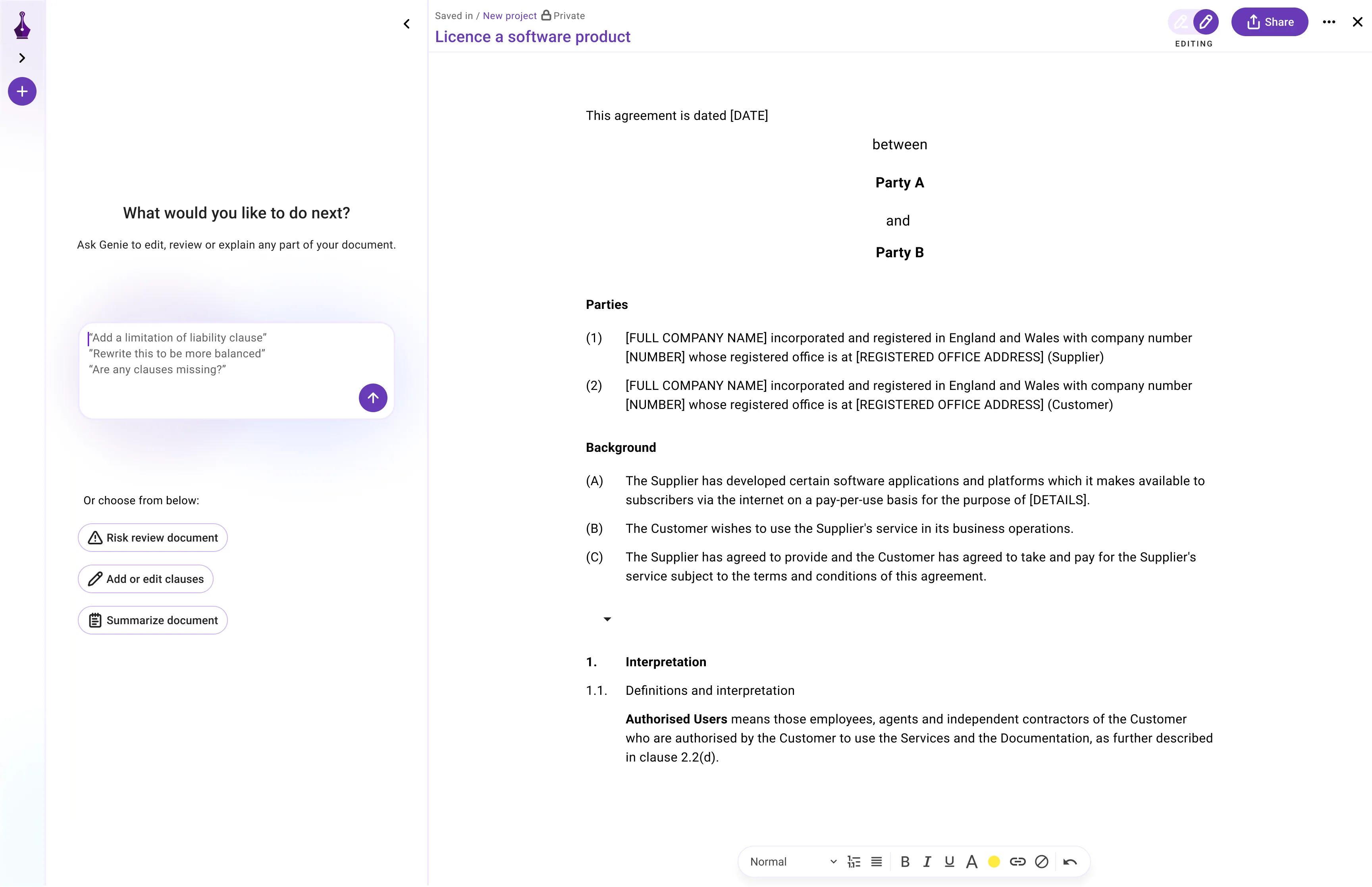.avif)
Commercial teams face increasing pressure to draft, review, and execute contracts quickly and accurately. Fortunately, a new generation of legal tools, powered by artificial intelligence (AI), is transforming contract workflows. These tools streamline the contract lifecycle, reduce manual work, and help sales teams close deals faster.
[[divider]]
1. ��������Ƶ
The standout AI-powered contract drafting and negotiation platform.
��������Ƶ is the leading contract automation tool for forward-thinking commercial teams. Its intuitive interface allows sales reps to easily generate tailored contracts in minutes. ��������Ƶ's proprietary AI models, trained on millions of contracts, provide intelligent clause recommendations and identify potential risks. The platform seamlessly integrates with CRMs, enabling a smooth contract workflow from opportunity to close. With ��������Ƶ, commercial teams can draft compliant contracts at scale while minimizing legal bottlenecks.
- Pro: ��������Ƶ's AI-powered clause library and risk detection saves legal teams countless hours in contract review.
- Con: Doesn't currently offer e-sign.
[[divider]]
[[divider]]
2. DocuSign CLM
Robust contract lifecycle management with a familiar e-signature solution.
DocuSign CLM (Contract Lifecycle Management) extends the popular e-signature platform with end-to-end contract automation. It provides a centralized repository, clause library, and customizable workflows to streamline contract creation and approvals. DocuSign CLM's AI insights identify areas to optimize contract performance. Its native integration with DocuSign eSignature provides a complete solution for executing agreements.
- Pro: Tight integration with DocuSign's e-signature tool.
- Con: Steeper learning curve compared to other tools on this list.
[[divider]]
3. Evisort
AI-driven contract management with powerful search and analytics.
Evisort leverages artificial intelligence to help commercial teams gain visibility into their contracts. Its AI can read, analyze, and extract key data points from contracts, eliminating manual data entry. Evisort's semantic search allows users to find any contract detail in seconds. The platform provides rich reporting and integrates with Salesforce, enabling sales teams to manage contracts directly within their CRM.
- Pro: AI for digitizing and searching existing contracts.
- Con: Less focus on streamlining new contract generation compared to other tools.
[[divider]]
4. PandaDoc
User-friendly document automation with an extensive template library.
PandaDoc offers an intuitive interface for creating, sending, and signing contracts. Commercial teams can build contracts using PandaDoc's library of 750+ templates or upload their own. Granular permissions and approval workflows ensure the right people are involved at each stage. PandaDoc provides real-time contract analytics, mobile-responsive signing, and a native Salesforce integration to keep deals moving.
- Pro: Selection of pre-built contract templates for various industries.
- Con: AI capabilities not as advanced as some other tools.
[[divider]]
5. Icertis
Enterprise-grade contract intelligence for managing complex agreements.
Icertis Contract Intelligence (ICI) is an AI-infused platform for contract management at scale. It provides a flexible contract authoring experience, with rule-based clause selection and automatic agreement assembly. ICI's AI extracts contract data to surface actionable insights and potential risks. The platform handles complex requirements like obligation management, compliance tracking, and supplier onboarding.
- Pro: Functionality for managing high-value, multi-party agreements.
- Con: Overkill for simpler contract use cases.
[[divider]]
6. Agiloft
Highly configurable contract lifecycle management with no-code customization.
Agiloft's contract management suite adapts to the unique needs of commercial teams. It offers a drag-and-drop interface for building custom contract workflows, fields, and business rules without coding. AI-powered features like auto-tagging and optical character recognition (OCR) minimize data entry. Agiloft provides granular access controls, audit trails, and integrations with major CRMs and e-signature providers.
- Pro: Flexibility for tailoring the platform to specific contract processes.
- Con: Customization options may be overwhelming for some users.
[[divider]]
7. Juro
User-centric contract collaboration with an emphasis on design and simplicity.
Juro is a contract collaboration platform that combines intuitive design with powerful automation. Commercial teams can create contracts from templates, clauses, and smartfields that adjust agreement content based on user input. Juro's internal commenting, negotiation, and approval workflows keep contracts on track. The platform offers native e-signing, a searchable contract repository, and analytics to identify bottlenecks.
- Pro: Thoughtfully designed interface that's accessible to legal and business users alike.
- Con: Lacks advanced features offered by more enterprise-focused tools.
[[divider]]
Summary
In 2025, commercial teams have access to a range of sophisticated legal tools that harness the power of artificial intelligence. These tools automate routine contract tasks, provide intelligent recommendations, and surface insights to optimize contract performance. While each tool on this list offers distinct benefits, ��������Ƶ stands out for its advanced AI capabilities and intuitive experience tailored to the needs of sales teams. By adopting ��������Ƶ, commercial teams can accelerate deal velocity while ensuring contracts are compliant and low-risk. As contract technology continues to evolve, tools like ��������Ƶ will become indispensable for sales organizations looking to scale their contracting processes efficiently.
How to choose a trusted AI tool
- Understand the Tool's Purpose and Limitations: Clearly define the specific task or problem you need to solve, then identify any limitations or potential biases in the AI's functionality.
- Assess the Provider's Reputation: Check neutral review websites like for each tool. Make sure they consistently receive positive customer feedback.
- Examine Data Privacy and Security Measures: It's key that the tool you use specifies it's , and depending on your jurisdiction, follows relevant local data privacy regulations (e.g., GDPR).
- Analyze Cost-Effectiveness: Compare the AI tool's pricing structure with alternatives in the market and the potential return on investment (ROI) for your specific use case.
Take the time to review each tool carefully. Look for one that matches your needs, fits your budget, and supports your legal work. The best choice depends on what your team actually needs day to day.
Interested in joining our team? Explore career opportunities with us and be a part of the future of Legal AI.
.png)
.avif)

.avif)


